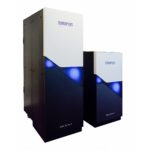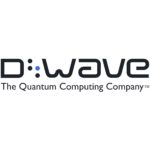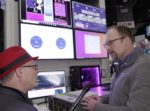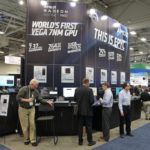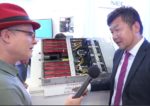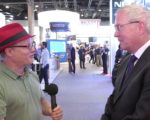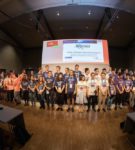Today Synopsys announced that NEC has selected Synopsys’ ZeBu Server 4 as its emulation solution for the verification of its SX-Aurora TSUBASA high-performance compute solution products. “Developing super computers requires running and analyzing many software applications on the new HPC architecture,” said Akio Ikeda, deputy general manager, AI Platform Division at NEC Corporation. “ZeBu Server 4 enabled execution of our HPC host software without modifications and running billions of software cycles prior to tapeout. We selected ZeBu Server 4 because of its superior performance and very fast bring-up time.”
NEC Selects Synopsys ZeBu Server 4 Emulation Environment for Supercomputer Verification
D-Wave and NEC to Accelerate Commercial Quantum Computing
Today D-Wave Systems announced the company has signed agreements with NEC Corporation to drive development of hybrid services that combine the best features of quantum and classical computers, and make it easy to incorporate quantum capabilities into integrated workflows. D-Wave and NEC plan to market and sell D-Wave’s Leap quantum cloud service, which includes hybrid tools and services, as well as new hybrid capabilities to be jointly developed. NEC has committed to invest $10 million in D-Wave. The collaboration will take effect upon the closing of NEC’s investment, which is subject to certain conditions.
NEC SX-Aurora Tops Energy Efficiency on HPCG Benchmark
In this video from SC19, Erich Focht from NEC describes how the company’s SX-Aurora vector architecture achieves extreme energy efficiency on the HPCG benchmark. After that, Shintaro Momose from NEC describes recent enhancements to the SX-Aurora vector computing platform and how extreme energy efficiency helped the company win major contracts with DWD in Germany and the National Institute for Fusion Science (NIFS) in Japan.
AMD Readies EPYC for Exascale with ROCm at SC19
In this video from SC19, Derek Bouius from AMD describes how the company’s new EPYC processors and Radeon GPUs can speed HPC and Ai applications. With its EPYC processors, Radeon Instinct accelerators, Infinity Fabric technologies, and ROCm open software, AMD is building an Exascale ecosystem for heterogeneous compute. “Community support for the pre-exascale software ecosystem continues to grow. This ecosystem is built on ROCm, the foundational open source components for GPU compute provided by AMD.”
AMD Delivers Best-in-Class HPC Performance at SC19
Today at SC19, AMD announced a set of new customer wins and new platforms supporting AMD EPYC processors and Radeon Instinct accelerators, as well as the release of ROCm 3.0 development environment. “HPC organizations are continuing to adopt the 2nd Gen AMD EPYC processor and Radeon Instinct accelerators for more powerful and efficient supercomputing systems. The 2nd Gen EPYC processors provide twice the manufacturing application performance and up to 60% faster Life Sciences simulations than competing solutions, while the Radeon Instinct GPU accelerator provides up to 6.6 peak theoretical TFLOPS Double Precision performance for HPC workloads.”
NEC Embraces Open Source Frameworks for SX-Aurora Vector Computing
In this video from ISC 2019, Dr. Erich Focht from NEC Deutschland GmbH describes how the company is embracing open source frameworks for the SX-Aurora TSUBASA Vector Supercomputer. “Until now, with the existing server processing capabilities, developing complex models on graphical information for AI has consumed significant time and host processor cycles. NEC Laboratories has developed the open-source Frovedis framework over the last 10 years, initially for parallel processing in Supercomputers. Now, its efficiencies have been brought to the scalable SX-Aurora vector processor.”
NEC Steps up with SX-Aurora Vector Engine for HPC
In this video from ISC 2019, Shintaro Momose, Ph. D. from NEC describes the company’s SX-Aurora Vector Engine. “These days, vector functions are added to scalar supercomputers to improve performance in most cases. That means that improving vector performance is the most important way to achieve high effective performance, even with scalar processors. In that respect, it could be said that vector processors are ahead of the trend.”
NEC SX-Aurora Vector Supercomputer to Power Weather Forecasting at DWD in Germany
In this video from ISC 2019, Dr. Rudolf Fischer from NEC describes how the company’s recent win at DWD demonstrates the power and efficiency of the SX-Aurora supercomputer. “The new HPC system will enable the development of seamless prediction of severe weather events, including thunderstorms or heavy rain. The system combines forecasting based on observations with very demanding numerical weather prediction models in order for a more precise prediction of the development and the tracks of such small-scale weather events up to twelve hours into the future.”
ISC19 Student Cluster Configurations: Less is More, GPUs Rule
In this special guest feature, Dan Olds from OrionX shares first-hand coverage of the Student Cluster Competition at the recent ISC 2019 conference. “I’m constantly amazed by the how many different system configurations we see in Student Cluster Competitions. Given that everyone has to use hardware that’s currently available on the market and they all have to be under the 3,000 watt power cap, you’d think that the systems would gravitate towards a common configuration – but you’d be wrong.”
NEC signs up as Reseller for Altair PBS Professional
Today Altair announced a global VAR agreement with NEC Corporation to market and sell industry-leading HPC workload manager and job scheduler Altair PBS Professional. As a result of the agreement, NEC has worldwide rights to bundle the PBS Professional solution with all NEC X86/Linux systems. “By combining Altair’s workload management technology and NEC’s hardware solution, we are confident that we can contribute to the realization of customers’ research needs quickly, easily and flexibly.”

